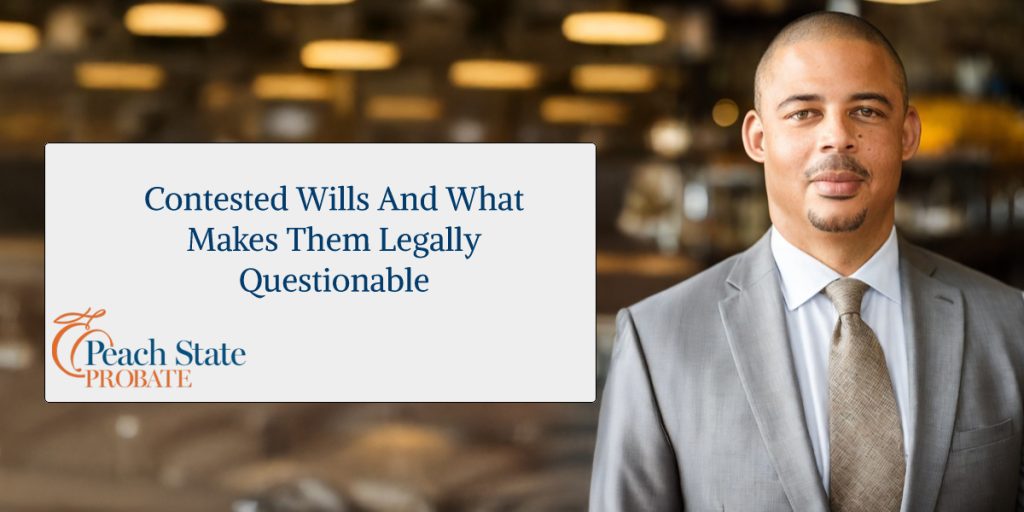## Understanding Contested Wills: A Comprehensive Exploration
Contested wills are a critical topic in the realm of probate law, often sparking disputes among family members and beneficiaries. A contested will arises when an individual, typically a beneficiary, contests the validity or provisions of a will, questioning its legality or the decedent’s intentions. Such challenges can occur due to various reasons, and understanding the nuances of contested wills is essential for anyone navigating the complexities of estate distribution.
A contested will may lead to lengthy legal battles, emotional turmoil, and significant financial strain for all involved. Parties contest a will based on several grounds, including undue influence, lack of capacity, improper execution, or fraud. Each of these elements presents a legal challenge that must be substantiated with concrete evidence, which is often the crux of such disputes. Recognizing these factors is crucial for claimants and defendants alike, as it can determine the outcome of the contest.
Moreover, the legal framework surrounding contested wills varies from state to state, with Georgia having its own set of regulations governing probate disputes. Consequently, it is vital for individuals to become familiar with the specific legal grounds on which wills can be contested within Georgia. By understanding what constitutes a contested will, you can better navigate the potential pitfalls associated with estate administration.
## The Significance of Contested Wills in Estate Planning
The issue of contested wills holds significant weight in estate planning and administration. For many families, a will represents not just a distribution of assets but also an expression of a loved one’s final wishes. When that document is contested, it can lead to fragmentation of family relationships and prolonged legal disputes over assets. This emotional and financial toll makes it imperative for individuals to consider the potential complications associated with their estate planning decisions.
Contesting a will can disrupt the intended distribution of assets and can even lead to a public court battle, exposing personal family matters to scrutiny. As the legalities unfold, beneficiaries may find themselves pitted against each other. This discord can complicate the grieving process and may affect the emotional well-being of those involved. In some instances, estate assets may be tied up in litigation for years, delaying proper inheritance and causing further distress among surviving family members.
Understanding the emotional and familial ramifications of contested wills can encourage estate planners to be more diligent when drafting their wills. To minimize the chances of challenges posthumously, it is crucial for individuals to ensure their wills are executed properly and to openly communicate their intentions with family members. Such proactive measures aim to ensure that the wishes of the deceased are honored without unnecessary disputes.
## Legal Framework Governing Contested Wills in Georgia
The legal framework governing contested wills in Georgia is rooted in state-specific statutes and case law. Understanding these laws is critical for individuals involved in will contests, whether as plaintiffs or defendants. In Georgia, the validity of a will can be challenged based on several legal grounds outlined in the probate code. These challenges can include arguments related to the testator’s mental capacity at the time of signing the will, the presence of undue influence by a beneficiary, or allegations of improper execution.
Georgia law requires that wills meet specific formalities to be deemed valid. For instance, a will must be in writing, signed by the testator, and witnessed by at least two individuals who are present at the signing. If these requirements are not met, the will may be declared invalid, leading to potential disputes regarding the distribution of assets. Furthermore, if challenges arise around the testator’s mental capacity or if the signing of the will is contested, the burden of proof often shifts to those who assert the will’s validity.
Another significant facet of Georgia probate law is the concept of standing. Only individuals with a direct interest in the estate, such as beneficiaries or heirs, generally have the legal standing to contest a will. Additionally, the statute of limitations for filing a will contest in Georgia is typically within the four-month window following the publication of a notice of the probate petition. Familiarity with these statutory nuances can better prepare individuals navigating contested wills.
## Real-World Scenarios of Contested Wills
Real-world scenarios provide insight into the complexities of contested wills, showcasing the various grounds on which they can be challenged. For example, a will may be contested due to allegations of undue influence, where a beneficiary may have appeared to manipulate or pressure the testator into changing their will shortly before their death. Such allegations require concrete evidence demonstrating that the beneficiary had a controlling effect over the testator, overshadowing their free will.
Another common scenario involves challenges based on a lack of testamentary capacity. Suppose an elderly individual suffers from dementia and executes a new will while under treatment. If heirs contest the will, they may present medical records and testimonies to support their claims that the decedent lacked the capacity to understand the implications of their actions. Such cases often hinge on expert testimonies that evaluate the mental state of the decedent at the time of signing.
Fraud is yet another ground for contesting a will, where an individual may falsely represent the contents of a will or present a completely fabricated document. For instance, if a family member discovers that a home was quietly transferred to another person posthumously and not as per the original will, they could raise a legal challenge on the grounds of fraudulent misrepresentation. These scenarios underscore the multifaceted nature of contested wills, emphasizing the need for comprehensive legal strategies.
## Essential Steps to Take If You Encounter a Contested Will
Encountering a contested will can be a daunting experience, yet there are essential steps an individual can take to navigate this challenging process. First, if you find yourself in possession of a will that is being contested, it is crucial to gather all pertinent documentation related to the estate and the will itself. This may include previous versions of the will, financial statements, and evidence of the decedent’s intentions—this documentation will prove invaluable in any legal proceeding.
Second, open lines of communication with other beneficiaries or parties involved can help alleviate tension and foster negotiation. Engaging in dialogue may lead to an amicable resolution without resorting to prolonged litigation. Sometimes misunderstandings or miscommunications are at the heart of contested wills, and addressing these issues early on can save time and resources.
Lastly, it is wise to consult with a legal professional who specializes in probate law. An attorney familiar with contested wills can provide critical insights and create a strategy tailored to your specific situation. Early legal intervention can often make a significant difference in the outcome of a contested will challenge, ensuring that your rights and interests are adequately protected.
## Common Pitfalls in Contested Wills
Navigating a contested will can lead individuals to make several common mistakes that can jeopardize their cases. One significant pitfall is not fully understanding the legal requirements surrounding wills in Georgia. Many individuals may assume that a will is simply valid because it exists, without verifying if it meets all formal execution criteria. Failing to confirm that a will has been appropriately signed and witnessed can lead to substantial legal hurdles.
Another mistake often encountered is overlooking the importance of gathering compelling evidence. Parties involved in challenging a will must provide substantial documentation and testimony to support their claims. Relying solely on verbal assertions without corroborative evidence can weaken a case significantly. Furthermore, individuals should be cautious when making public statements or admissions regarding the will, as these can sometimes be misconstrued in a legal setting.
Finally, a failure to adhere to procedural timelines can have dire consequences. In Georgia, the statute of limitations for contesting a will is strict, and missing the window could bar individuals from pursuing their claims altogether. Therefore, it is crucial for involved parties to stay informed about pertinent deadlines and the procedural requirements of probate court, ensuring they act swiftly and efficiently when disputes arise.
## Recognizing When to Seek Legal Counsel
Determining when to seek the assistance of a legal professional in matters concerning contested wills can significantly impact the outcome of your case. One clear indication is when you find yourself facing a dispute regarding the validity of a will. If other beneficiaries are contesting the will, having legal support can help you navigate the complexities of the case and ensure that your interests are protected.
Another instance where legal counsel is invaluable is during the discovery phase of litigation. This stage involves gathering evidence, witness statements, and documents that can support your case. An attorney skilled in probate law can help navigate this phase effectively, ensuring compliance with legal protocols while gathering the necessary evidence to bolster your position.
Additionally, if negotiations with other beneficiaries are becoming contentious or if a settlement seems unlikely, it may be time to consult an attorney. Professional representation can provide a clear pathway through potential mediation or litigation scenarios, which may otherwise lead to drawn-out disputes. Legal counsel can advocate on your behalf, facilitating communication and striving to reach an agreement amicably, if possible.
## The Advantages of Having Legal Representation
Legal representation in matters involving contested wills brings numerous advantages that can significantly affect the outcome of a case. To begin with, having an attorney who understands the intricacies of probate law ensures that you are well-informed about your rights and options. This knowledge can play a vital role in developing an effective legal strategy that addresses your unique needs and concerns while navigating family dynamics.
Moreover, legal professionals can provide valuable assistance during negotiations or mediation sessions. Experienced attorneys can help facilitate dialogue between conflicting parties, aiming to reach an amicable resolution before resorting to litigation. They are adept at identifying potential compromises while safeguarding their client’s interests, often leading to outcomes that benefit all parties involved.
In situations where litigation becomes unavoidable, legal representation becomes even more critical. An attorney can advocate for you in court, presenting evidence, examining witnesses, and crafting legal arguments with precision. Their proficiency in courtroom procedures, deadlines, and documentation ensures that your case is presented effectively and comprehensively, significantly improving the likelihood of a favorable outcome.
## How Peach State Probate Is Uniquely Positioned to Assist
Peach State Probate stands out as a premier legal resource for individuals confronting contested will scenarios in Georgia. The firm possesses a thorough understanding of Georgia’s probate laws, tailored to address the state-specific challenges that arise during contested will proceedings. This localized knowledge equips Peach State Probate to guide clients through the complex legal landscape effectively.
Furthermore, the attorneys at Peach State Probate are deeply committed to client satisfaction and strive to ensure that clients feel heard and understood throughout the process. With a focus on open communication and transparency, they foster a collaborative environment that empowers clients to make informed decisions about their legal strategies. This focus on personalized service sets Peach State Probate apart from other firms.
Additionally, Peach State Probate has a proven record of success in handling contested wills, with experience in mediation, negotiation, and litigation. Clients can feel secure knowing that their legal representation is both knowledgeable and dedicated. This combination of professional skill and personal care helps clients navigate the often emotionally charged landscape of contested wills with confidence and clarity.




